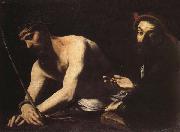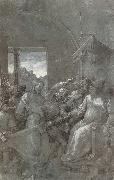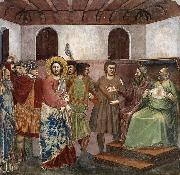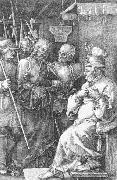
Oil On
Canvas, Real Flavor of Old Masters
|
CARACCIOLO, Giovanni Battista
|
|||
|
|
|||
| Italian Baroque Era Painter, ca.1578-1635 Italian painter. He was one of the greatest Caravaggesque painters and the founder of Neapolitan Caravaggism. His Liberation of St Peter (c. 1615; Naples, Pio Monte della Misericordia; ) and Christ Washing the Feet of the Disciples (1622; Naples, Certosa di S Martino; see fig. 2 below) are masterpieces of 17th-century Neapolitan art, and attain a powerful and tragic grandeur. | |||
|
|
|||
|
|
Christ Before Caiaphas new3/CARACCIOLO, Giovanni Battista-865875.jpg Painting ID:: 29169 Visit European Gallery |
mk65 Oil on canvas 29x40 1/2" | |
Height Width |
INS/CM |
||
|
X |
|
||
|
|
|||
|
Albrecht Durer
|
|||
|
|
|||
| b.May 21, 1471, Imperial Free City of Nernberg [Germany] d.April 6, 1528, Nernberg Albrecht Durer (May 21, 1471 ?C April 6, 1528) was a German painter, printmaker and theorist from Nuremberg. His still-famous works include the Apocalypse woodcuts, Knight, Death, and the Devil (1513), Saint Jerome in his Study (1514) and Melencolia I (1514), which has been the subject of extensive analysis and interpretation. His watercolours mark him as one of the first European landscape artists, while his ambitious woodcuts revolutionized the potential of that medium. D??rer introduction of classical motifs into Northern art, through his knowledge of Italian artists and German humanists, have secured his reputation as one of the most important figures of the Northern Renaissance. This is reinforced by his theoretical treatise which involve principles of mathematics, perspective and ideal proportions. His prints established his reputation across Europe when he was still in his twenties, and he has been conventionally regarded as the greatest artist of the Renaissance in Northern Europe ever since. | |||
|
|
|||
|
|
Christ Before Caiaphas new16/Albrecht Durer-258393.jpg Painting ID:: 42303 Visit European Gallery |
mk168 283x178mm | |
Height Width |
INS/CM |
||
|
X |
|
||
|
|
|||
|
GIOTTO di Bondone
|
|||
|
|
|||
| Italian Early Renaissance Painter, 1267-1337 Italian painter and designer. In his own time and place he had an unrivalled reputation as the best painter and as an innovator, superior to all his predecessors, and he became the first post-Classical artist whose fame extended beyond his lifetime and native city. This was partly the consequence of the rich literary culture of two of the cities where he worked, Padua and Florence. Writing on art in Florence was pioneered by gifted authors and, although not quite art criticism, it involved the comparison of local artists in terms of quality. The most famous single appreciation is found in Dante's verses (Purgatory x) of 1315 or earlier. Exemplifying the transience of fame, first with poets and manuscript illuminators, Dante then remarked that the fame of Cimabue, who had supposed himself to be the leader in painting, had now been displaced by Giotto. Ironically, this text was one factor that forestalled the similar eclipse of Giotto's fame, which was clearly implied by the poet. | |||
|
|
|||
|
|
Christ before Caiaphas new19/GIOTTO di Bondone-832529.jpg Painting ID:: 52387 Visit European Gallery |
1304-06 Fresco, 200 x 185 cm | |
Height Width |
INS/CM |
||
|
X |
|
||
|
|
|||
|
Albrecht Durer
|
|||
|
|
|||
| b.May 21, 1471, Imperial Free City of Nernberg [Germany] d.April 6, 1528, Nernberg Albrecht Durer (May 21, 1471 ?C April 6, 1528) was a German painter, printmaker and theorist from Nuremberg. His still-famous works include the Apocalypse woodcuts, Knight, Death, and the Devil (1513), Saint Jerome in his Study (1514) and Melencolia I (1514), which has been the subject of extensive analysis and interpretation. His watercolours mark him as one of the first European landscape artists, while his ambitious woodcuts revolutionized the potential of that medium. D??rer introduction of classical motifs into Northern art, through his knowledge of Italian artists and German humanists, have secured his reputation as one of the most important figures of the Northern Renaissance. This is reinforced by his theoretical treatise which involve principles of mathematics, perspective and ideal proportions. His prints established his reputation across Europe when he was still in his twenties, and he has been conventionally regarded as the greatest artist of the Renaissance in Northern Europe ever since. | |||
|
|
|||
|
|
Christ before Caiaphas new21/Albrecht Durer-667839.jpg Painting ID:: 63591 Visit European Gallery |
1512 Engraving, 117 x 74 mm Metropolitan Museum of Art, New York Sheet No. 4 of the Engraved Passion. The ceiling, in this instance, gives the engraving a feeling of architectural enclosure, quite in contrast to other subjects of the series. The ceiling beams are directed toward the vanishing point on the left. This serves to emphasize the dialogue between Christ and Caiaphas, which is further enhanced by the lighting. The guardsman on the right seems Leonardesque. This engraving is based on the corresponding subject in the Green Passion. The main figures, especially the deceitful Caiaphas, are drawn in a masterly manner.Artist:D?RER, Albrecht Title: Christ before Caiaphas (No. 4) Painted in 1501-1550 , German - - graphics : religious | |
Height Width |
INS/CM |
||
|
X |
|
||
|
|
|||










